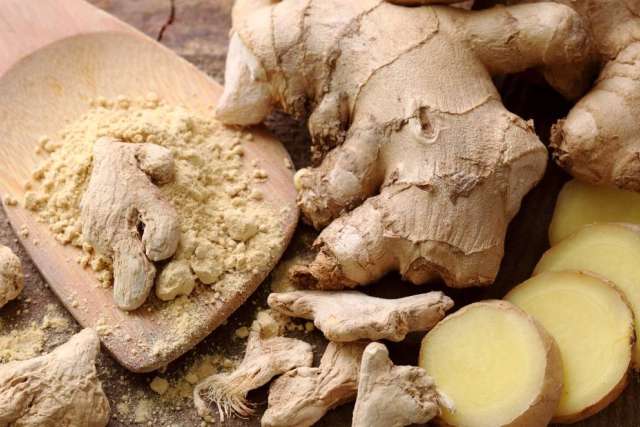Many people use ginger only in dishes associated with Eastern cuisines. But as researchers uncover more information about how ginger affects your health, you may want to think about making it a diet staple.
Ginger is a flowering root plant from Southeast Asia and may look intimidating at first. The fresh ginger you find in the produce aisle is the root of the ginger plant. But just below the bumpy, brown layer of skin, ginger packs tons of flavor and powerful health advantages.
Here’s what you should consider:
Health benefits of ginger
Ginger contains vitamin C, magnesium and potassium, which are all valuable to your health. But ginger’s secret weapon is one of its natural oils: gingerol. Natural oils give ginger its unique flavor and smell, and gingerol — ginger’s most important oil — has powerful medicinal properties. It reduces , works as an antioxidant and offers numerous other benefits to your health:
Helps with osteoarthritis pain
Ginger will not necessarily bring you immediate pain relief. But for inflammation-related conditions, such as osteoarthritis, studies show that ginger improves pain and stiffness over time. While earlier research studied the effects of ginger when consumed, newer studies are focusing on the effects of applying ginger oil topically to relieve pain associated with osteoarthritis.
Relieves menstrual cramps
In 2020, more than 20 million women in the United States used non-prescription products to relieve menstrual pain. But research shows that ginger may be just as effective at easing period pain as over-the-counter pain medications such as ibuprofen. One gave women doses of either ginger or a nonsteroidal anti-inflammatory drug (NSAID) for the first three days of their menstrual cycle. Ginger reduced the pain just as effectively as the NSAIDs.
Improves blood sugar regulation
New research is finding that gingerol helps keep blood sugar levels steady — an important factor in managing the long-term effects of diabetes. One small showed that taking just 2 grams of powdered ginger supplement daily noticeably lowered fasting blood sugar in people with type 2 diabetes. Another found that consuming ginger powder for 12 weeks improved insulin sensitivity in people with type 2 diabetes.
Soothes an upset stomach
While it’s the carbonation in ginger ale that tends to calm your tummy, ginger does have the ability to ease an upset stomach. A of more than 100 trials concluded that ginger is highly effective against nausea: Taking just 1 gram of ginger significantly reduces the symptoms of nausea in pregnant women. It also helps with motion sickness and is used to relieve nausea and vomiting after surgery or associated with cancer treatment.
Improves indigestion
Chronic indigestion is often the result of the stomach taking too long to empty its contents. Ginger speeds up that process by helping food move more quickly through the gastrointestinal tract. Several studies found that taking ginger speeds up gastric emptying, even when participants did not have chronic indigestion.
Reduces risk of heart disease
High cholesterol levels, especially LDL (bad) cholesterol, are linked to an increased risk of heart disease. But there’s some evidence that ginger can reduce cholesterol levels. While more research is needed, early studies in both humans and animals show that adding ginger to your diet may result in reduced LDL levels, total cholesterol and blood triglyceride levels.
Adding ginger to your diet
Ginger is easy to incorporate into your diet — and a little goes a long way. Peeled, fresh ginger can be sliced, diced or shredded to use in recipes. But you can also find ginger dried, powdered, or as an oil or juice. Just keep in mind that fresh ginger offers more gingerol than dried or powdered ginger.
Fresh, unpeeled ginger lasts in the fridge for up to three weeks. If skin looks wrinkled or moldy, it’s time to toss it. If you don’t plan to use it right away, peeled ginger root can be frozen.
If you are using powdered ginger, the taste and smell may be different, and you’ll want to use less. Typically, ¼ teaspoon of powdered ginger is equal to 1 teaspoon of fresh ginger. Powdered ginger is most often used in baking.
How much ginger should you take daily?
Ginger is safe to eat daily, but experts recommend limiting yourself to 3 to 4 grams a day — stick to 1 gram daily if you’re pregnant. Taking more than 6 grams of ginger a day has been proven to cause gastrointestinal issues such as reflux, heartburn and diarrhea.
The equivalent of 1 gram of ginger includes:
- ½ teaspoon of powdered ginger
- 1 teaspoon of grated raw ginger
- 4 cups of water steeped with ½ teaspoon grated ginger
What to consider before adding ginger to your diet
If you plan to take ginger as an herbal supplement, talk to your doctor first. High doses of ginger supplements can have digestive side effects. Ginger should never be used in place of medication prescribed for you by your doctor.
Reach out to your primary care physician to see how ginger may benefit your health.



